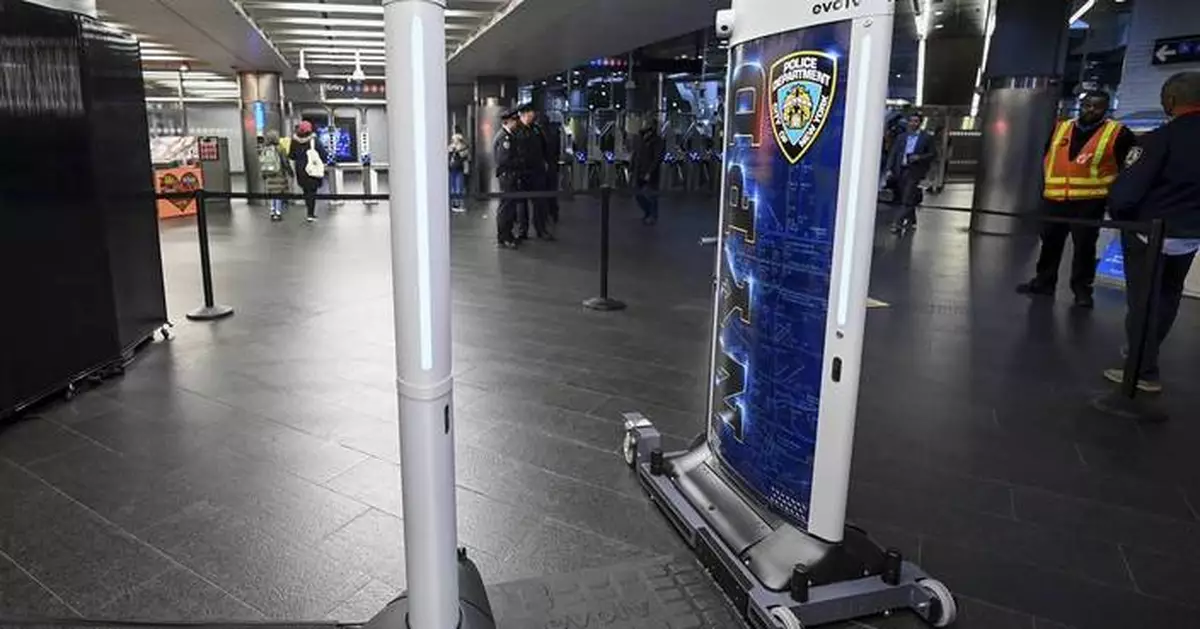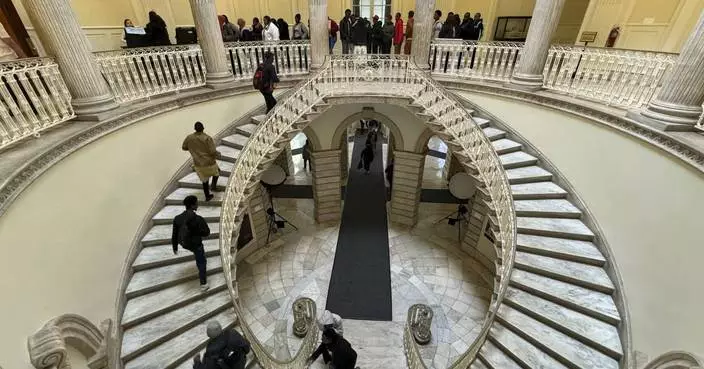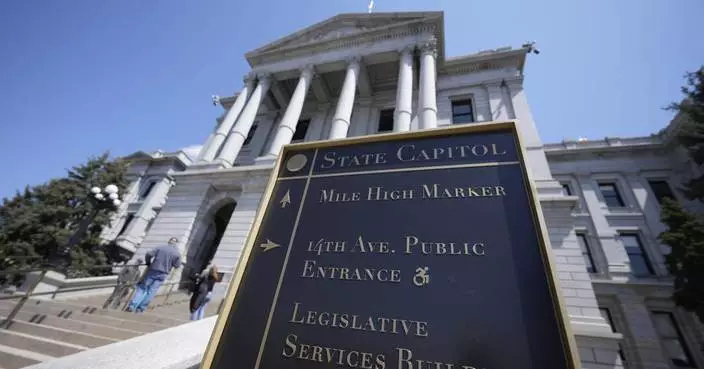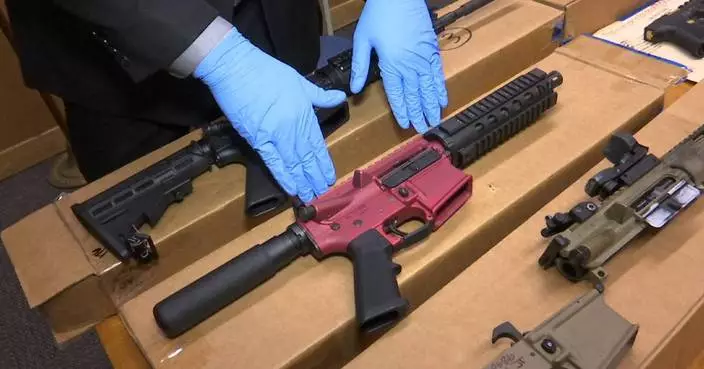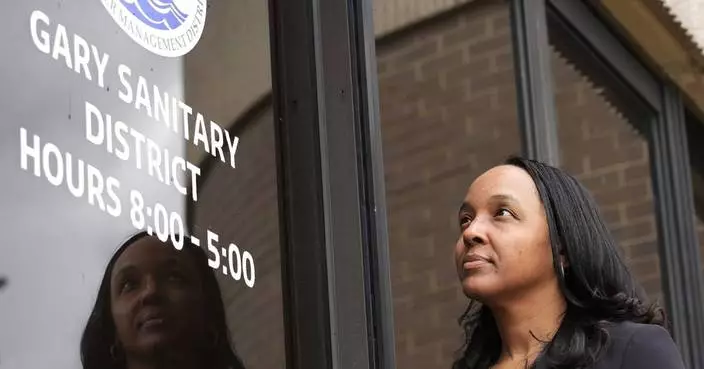NEW YORK (AP) — New York City officials announced a pilot program on Thursday to deploy portable gun scanners in the subway system, part of an effort to deter violence underground and to make the system feel safer.
The scanners will be introduced in certain stations after a legally mandated 90-day waiting period, Mayor Eric Adams said.
Click to Gallery
NEW YORK (AP) — New York City officials announced a pilot program on Thursday to deploy portable gun scanners in the subway system, part of an effort to deter violence underground and to make the system feel safer.
In this photo provided by The Metropolitan Transportation Authority (MTA), Mayor Eric Adams smiles during a news conference about new portable weapon detectors in New York, March 28, 2024. New York City officials announced a pilot program on Thursday to deploy portable gun scanners in the subway system, part of an effort to deter violence underground and to make the system feel safer. (Marc A. Hermann/Metropolitan Transportation Authority via AP)
In this photo provided by The Metropolitan Transportation Authority (MTA), new weapon detectors that can be deployed at subway entrances are displayed during a news conference in New York, March 28, 2024. New York City officials announced a pilot program on Thursday to deploy portable gun scanners in the subway system, part of an effort to deter violence underground and to make the system feel safer. (Marc A. Hermann/Metropolitan Transportation Authority via AP)
In this photo provided by The Metropolitan Transportation Authority (MTA), new weapon detectors that can be deployed at subway entrances are displayed during a news conference in New York, March 28, 2024. New York City officials announced a pilot program on Thursday to deploy portable gun scanners in the subway system, part of an effort to deter violence underground and to make the system feel safer. (Marc A. Hermann/Metropolitan Transportation Authority via AP)
In this photo provided by The Metropolitan Transportation Authority (MTA), new weapon detectors that can be deployed at subway entrances are displayed during a news conference in New York, March 28, 2024. New York City officials announced a pilot program on Thursday to deploy portable gun scanners in the subway system, part of an effort to deter violence underground and to make the system feel safer. (Marc A. Hermann/Metropolitan Transportation Authority via AP)
“Keeping New Yorkers safe on the subway and maintaining confidence in the system is key to ensuring that New York remains the safest big city in America,” said Adams, who also announced a plan to send additional outreach workers into subway stations to try to get people with mental health issues who are living in the system into treatment.
Adams said officials would work to identify companies with expertise in weapons detection technology and that after the waiting period the scanners would be instituted in some subway stations "where the NYPD will be able to further evaluate the equipment’s effectiveness.”
The scanner that Adams and police officials introduced during Thursday's news conference in a lower Manhattan station came from Evolv, a publicly traded company that has been accused of doctoring the results of software testing to make its scanners appear more effective than they are.
Jerome Greco, supervising attorney of the digital forensics unit at the Legal Aid Society, said gun detection systems can trigger false alarms and cause panic.
“This Administration’s headstrong reliance on technology as a panacea to further public safety is misguided, costly, and creates significant invasions of privacy,” Greco said in a news release.
Adams said the city would perform its own analysis of the scanners' accuracy.
“People may have had bad experiences with this technology,” Adams, a former transit police officer, said. “What we witnessed, it's living up to our expectations. And we’re going to do an analysis and determine, hey is it living up to our expectations.”
City officials did not say exactly where the scanners would be installed. The device they demonstrated at the Fulton Street station beeped after brief delay when a police officer with a holstered gun went through but was silent when officers carrying cellphones and other electronic devices passed through.
Overall, violent crime is rare in the city's subway system, which serves about 3 million riders a day, but there have been two recent high-profile shooting incidents. Earlier in March, a man was shot with his own gun and critically wounded during a confrontation with another passenger. Last month, one person was killed and several others wounded when shots rang out amid a fight between two groups on a rush-hour subway car.
There were five killings in the system last year, down from 10 the year prior, according to police. There were three homicides in the first two months of 2024.
The scanner announcement came days after a fatal shove in an East Harlem subway station on Monday once again brought the issue of subway safety to the forefront.
Also on Monday, New York City officials announced a plan to send 800 more police officers into the subway system to crack down on fare evasion.
Before the latest surge, the NYPD had seized 17 guns from people stopped in the system this year, Metropolitan Transportation Authority Chair and CEO Janno Lieber said at a board meeting Wednesday.
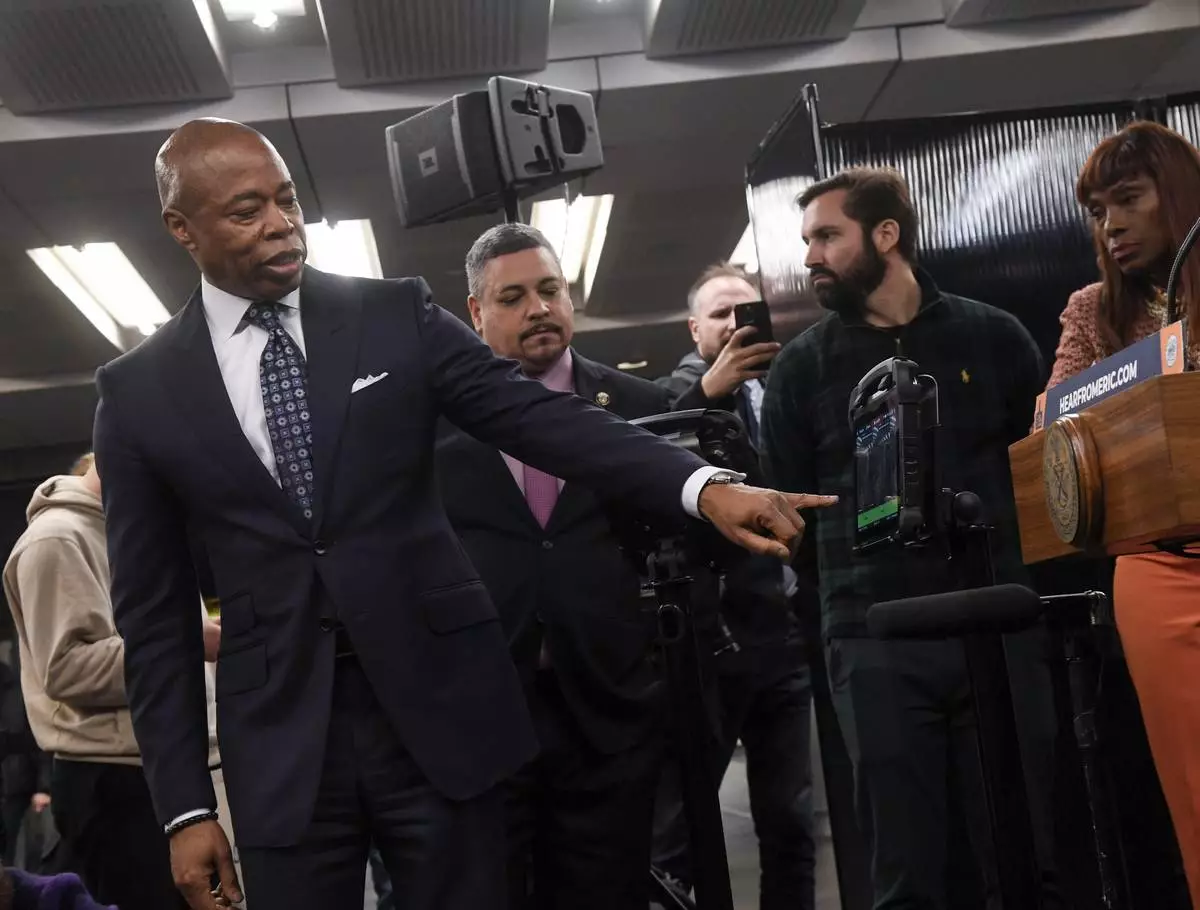
In this photo provided by The Metropolitan Transportation Authority (MTA), Mayor Eric Adams, left, points to new portable weapon detectors during a news conference in New York, March 28, 2024. New York City officials announced a pilot program on Thursday to deploy portable gun scanners in the subway system, part of an effort to deter violence underground and to make the system feel safer. (Marc A. Hermann/Metropolitan Transportation Authority via AP)
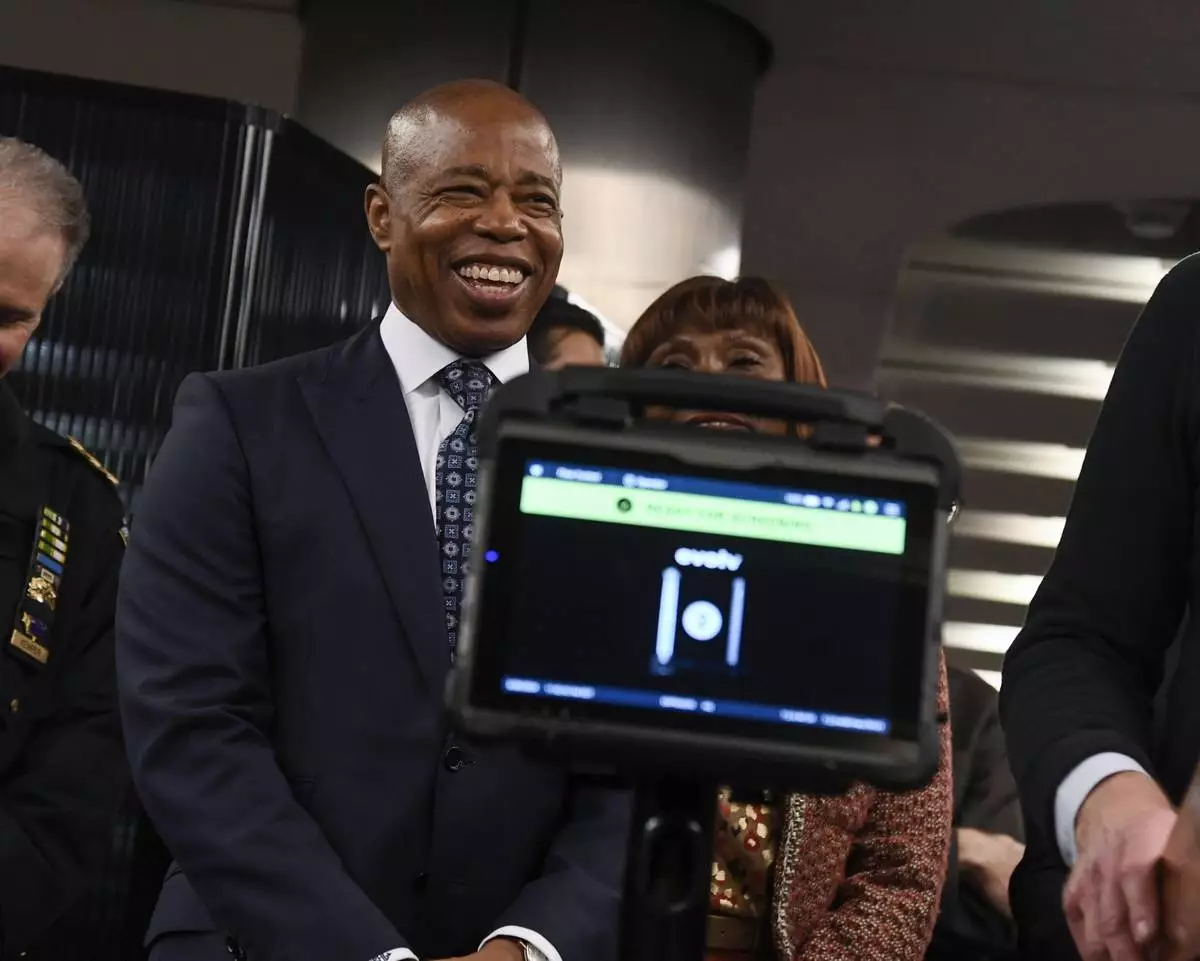
In this photo provided by The Metropolitan Transportation Authority (MTA), Mayor Eric Adams smiles during a news conference about new portable weapon detectors in New York, March 28, 2024. New York City officials announced a pilot program on Thursday to deploy portable gun scanners in the subway system, part of an effort to deter violence underground and to make the system feel safer. (Marc A. Hermann/Metropolitan Transportation Authority via AP)
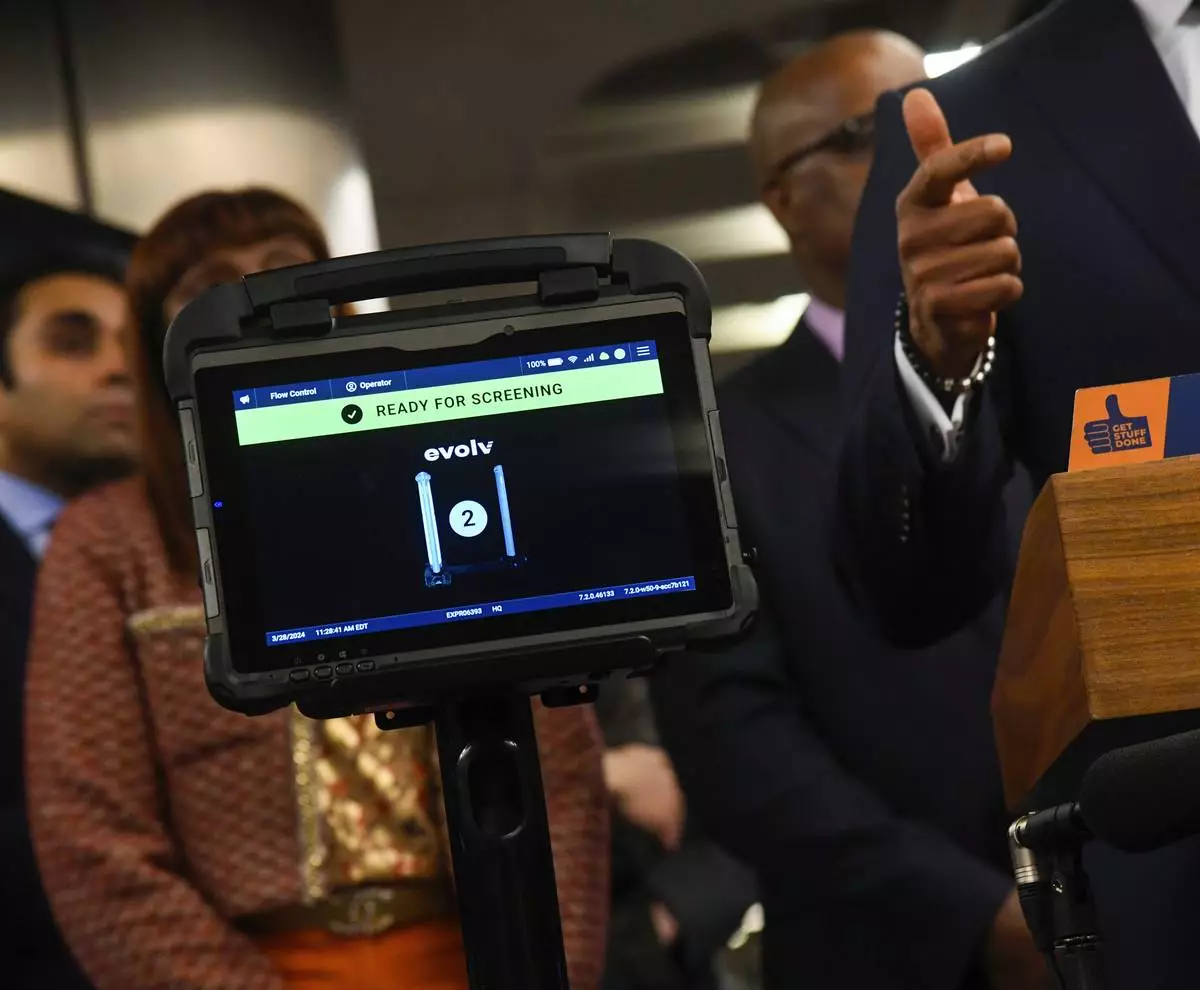
In this photo provided by The Metropolitan Transportation Authority (MTA), new weapon detectors that can be deployed at subway entrances are displayed during a news conference in New York, March 28, 2024. New York City officials announced a pilot program on Thursday to deploy portable gun scanners in the subway system, part of an effort to deter violence underground and to make the system feel safer. (Marc A. Hermann/Metropolitan Transportation Authority via AP)
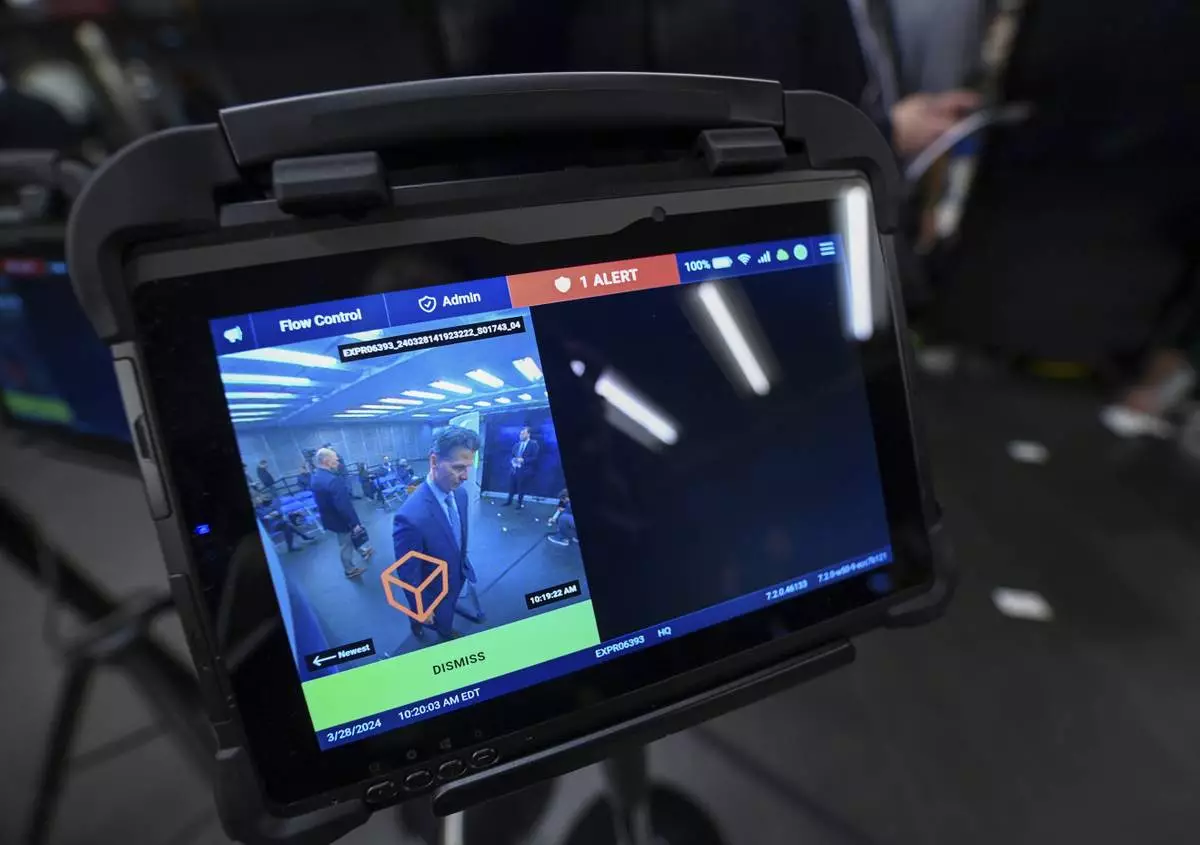
In this photo provided by The Metropolitan Transportation Authority (MTA), new weapon detectors that can be deployed at subway entrances are displayed during a news conference in New York, March 28, 2024. New York City officials announced a pilot program on Thursday to deploy portable gun scanners in the subway system, part of an effort to deter violence underground and to make the system feel safer. (Marc A. Hermann/Metropolitan Transportation Authority via AP)
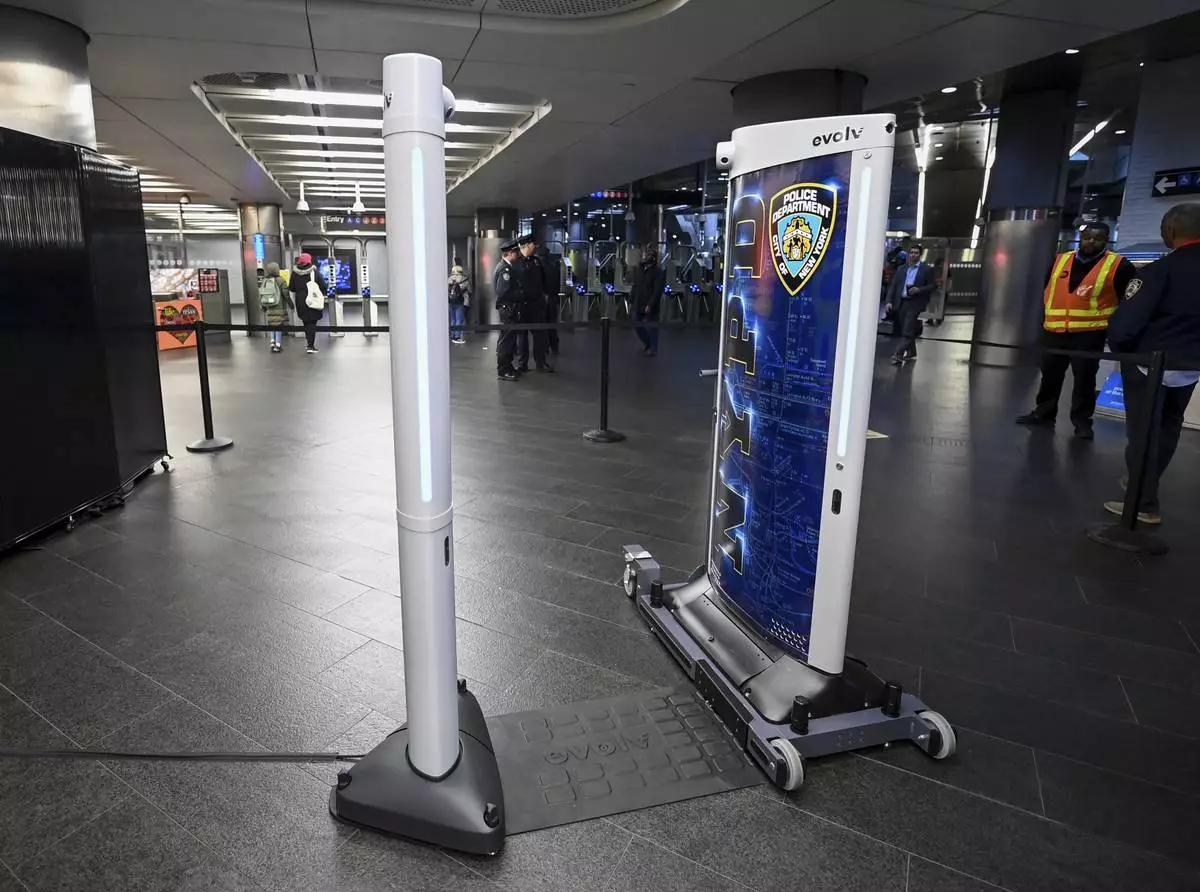
In this photo provided by The Metropolitan Transportation Authority (MTA), new weapon detectors that can be deployed at subway entrances are displayed during a news conference in New York, March 28, 2024. New York City officials announced a pilot program on Thursday to deploy portable gun scanners in the subway system, part of an effort to deter violence underground and to make the system feel safer. (Marc A. Hermann/Metropolitan Transportation Authority via AP)
AUGUSTA, Maine (AP) — Democratic Gov. Janet Mills on Friday signed into law a suite of gun safety legislation approved by lawmakers after the deadliest mass shooting in state history, expanding background checks for private sales of weapons, bolstering the state's “yellow flag” law, criminalizing the transfer of guns to prohibited people and expanding mental health crisis care.
The governor told lawmakers during her State of the State address that doing nothing was not an option after an Army reservist with an assault rifle killed 18 people and injured 13 others in Lewiston on Oct. 25.
The bills drew opposition from Republicans who accused Democrats, who control both legislative chambers, of using the tragedy to advance proposals, some of which had been previously defeated. Mills said Friday the proposals would improve public safety while respecting the state's long traditions of gun ownership and outdoor heritage.
“This law represents important, meaningful progress, without trampling on anybody’s rights, and it will better protect public safety by implementing reasonable reforms and by significantly expanding mental health resources," Mills said.
The new law signed by the governor doesn't require universal background checks but it does require background checks for people who advertise a gun for sale on Craigslist, Facebook Marketplace or elsewhere. Sales would be required to be checked against the National Instant Criminal Background Check System, as is required for commercial sales at federally licensed firearm dealers, the governor's office said.
The legislation includes changes to the state's yellow flag law that allows police to assess an individual, take the person into protective custody for a mental health evaluation and hold a hearing before a judge to remove guns from someone in a psychiatric crisis.
The new law allows police to go directly to a judge for a warrant, streamlining the process. It eliminates a hurdle when a deputy was stymied by the Lewiston gunman’s refusal to answer the door for a required face-to-face meeting that’s necessary under current law. Law enforcement members have said in testimony about the shootings that the state's existing yellow flag law was cumbersome and hard to apply.
Republicans in the state remain opposed to the bill, specifically because of the expanded background check proposal, said the Maine House of Representatives Republican leader, Rep. Billy Bob Faulkingham, on Friday.
“House Republicans have voiced ongoing support for strengthening Maine’s so-called yellow flag law and mental health services, but oppose the governor’s bill," Faulkingham said. “The unenforceable background check provision will only create confusion among law-abiding Mainers.”
Supporters of expanded gun control laws, who have advocated for the passage of the new standards for months, described the approval of the rules as a victory. Twenty-two states now have a background check law, said John Feinblatt, president of Everytown for Gun Safety.
Advocates also said they're hopeful other new gun measures approved by lawmakers in Maine will soon become law.
“Today is a victory for the gun violence prevention movement and a demonstration of what Mainers can accomplish to keep our communities safe when we work together,” said Vicki Farsaci, a volunteer with the Maine chapter of Moms Demand Action.
The bill signed by the governor also strengthens legal standards for prosecution and penalties to deter other people from selling weapons to prohibited buyers, making it a felony crime. The governor's office said in a statement that the new approach “will mean that transfers of firearms to family members or trusted friends, as is common in Maine, will remain unchanged, but it will incentivize checks against the (National Instant Criminal Background Check System) for private, unadvertised sales to unknown individuals through the threat of increased risk of prosecution and prison time.”
Mills' approvals of the gun proposals came a day after a special commission she convened interviewed fellow reservists of Card who raised warnings about Card's increasingly erratic behavior. Card was found dead of a self-inflicted gunshot wound in the aftermath of the mass shooting after an extensive search.
One of the fellow reservists interviewed on Thursday, Sean Hodgson, told superiors in September: “I believe he’s going to snap and do a mass shooting.”
Mills also proposed the creation of a new violence and injury prevention program requiring the Maine Center for Disease Control and Prevention to serve as a clearinghouse for data from law enforcement, hospitals, schools and other sources to inform public policy decisions.
Her proposal for a network of crisis centers, meanwhile, would build upon the first such facility already in operation in Portland and a second one that’s being created in central Maine.

FILE — Gov. Janet Mills attends an event, March 11, 2022, in Augusta, Maine. Mills on Friday, April 26, 2024, signed off on a law a suite of gun safety legislation approved by lawmakers after the deadliest mass shooting in state history, expanding background checks for private sales of weapons, bolstering the state’s “yellow flag” law, criminalizing the transfer of guns to prohibited people and expanding mental health crisis care. (AP Photo/Robert F. Bukaty, File)







